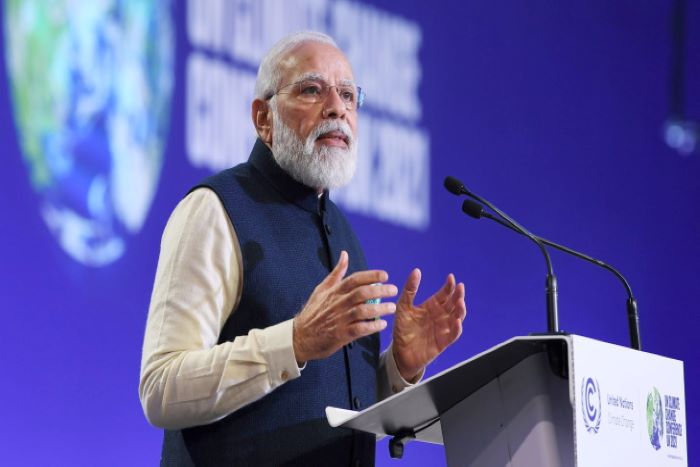India’s Cabinet approved an updated Nationally Determined Contribution (NDC) under the Paris Agreement this week. According to the new NDC, India now stands committed to reduce Emissions Intensity of its GDP by 45% by 2030, from 2005 levels. The previous NDC set a target of 33 to 35% compared to 2005 levels.
The country will also aim to achieve about 50% cumulative electric power installed capacity from non-fossil fuel-based energy resources by 2030. This was previously set at 40%. ‘Lifestyle for Environment’ or LIFE has been added to India’s NDC to further a healthy and sustainable lifestyle, which was first introduced to the world by Prime Minister Narendra Modi at COP26 as a key component in fighting climate change. The new NDC also seeks to capture a “citizen-centric approach to combat climate change”, the government said. India had submitted its first NDC to the UNFCCC back in 2015.
Energy Conservation Bill passed in Lok Sabha; will pave way for carbon markets in India
The Energy Conservation Amendment Bill 2022, an amendment to the 2001 Energy Conservation Act, was introduced in the Lok Sabha August 3, 2022 and passed in the lower house August 8. The bill seeks to increase the use of renewables and promote energy efficiency by widening the ambit of renewable energy use mandates, particularly on industry. It will effectively push for industrial decarbonisation through minimum non-fossil energy use mandates. Industrial sectors that have been mentioned include mining, steel, cement, textile, chemicals and petrochemicals), the transport sector (including railways) and commercial buildings. While the minimum mandates have not yet been specified, penalties for non-compliance will amount to up to Rs 10 lakh plus an additional penalty of twice the price of the oil equivalent of energy consumed above the prescribed norm. The Bill will also bring large residential buildings under the Energy Conservation Code, and open the doors for energy conservation standards to be applicable on products like automobiles and ships. The Bill also includes provisions to institute changes in the governing council of the Bureau of Energy Efficiency.
Importantly, the Bill provides for the issuance of carbon credit certificates (CERs) by the government or any authorised body. These certificates lay the grounds for the establishment of a carbon market in the country.
India requires $20 trillion capex in next 50 years to meet net-zero by 2070 target
The ambitious net-zero by 2070 goal announced by PM Narendra Modi at COP26 will cost the country dearly. According to a new report by research firm UBS, India will need a capital expenditure of $20 trillion over the next 50 years to achieve the ambitious target.
The report was also bullish on India’s ability to domestically produce solar cells, batteries and electrolysers. The report cited the example of rapid 4G implementation in India to demonstrate India’s ability to be self-reliant despite entering the renewables market much after China. The sector will have to be supported by policies, financial incentives and corporate backing, the report stated.
US set to pass bill that includes $369 billion in climate, energy spending
The US passed a bill that includes $369 billion in climate and energy spending. According to Democrats, this will achieve 80% of the work needed to meet the country’s 2030 climate target. The bill was passed after a dramatic U-turn by Senator Joe Manchin, who represents coal-rich West Virginia.
The Inflation Reduction Act of 2022 will direct the $369 billion toward clean energy and put the US economy on track to cut emissions 40% or more by 2030. The Act will likely be voted on in the House this week, where Democrats have a strong majority, and will shortly thereafter be signed into law by President Biden.
African nations to push for gas investments at COP27?
According to a report in The Guardian, African countries are likely to use COP27 to be held later this year to push for new fossil fuel investments across the continent. Considering the current global gas shortage, European nations are likely to support oil and gas exploration in Africa, the Guardian reported.
Climate Home News, however, reported that African climate diplomats rejected the African Union’s proposal that promoted gas at COP27 as a bridge fuel for the continent. According to the diplomats, a pro-gas stance at the UN summit was too controversial and would divert attention away from important issues such as climate finance and adaptation.
Australia set to pass its first climate change legislation in a decade
Australia’s House of Representatives passed the country’s first climate change legislation in more than a decade this month. Two emissions targets have now been enshrined into law as a result—a 43% cut below 2005 levels by 2030, and a reduction to “net zero” by 2050. It also gives the Climate Change Authority, an agency that was formed 10 years ago, a more prominent role after being largely ignored by the previous Coalition government.
It will now have to give yearly advice on how Australia can reach its climate targets and also advice on a new target for 2035. The Bill will now have to be passed in the Senate which is likely in September, but this is now just a formality, The Guardian reported.


